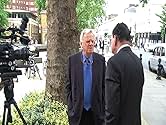Michael Grade
- Writer
- Producer
- Executive
For Michael Grade, a distinguished and highly successful career in showbusiness appeared to be in the genes. Born in 1943 in London, England, his father was Leslie Grade and his uncles were Lew Grade and Bernard Delfont. Grade became a trainee journalist on the Daily Mirror in 1960 (he was their sports columnist 1964 - 1966). In 1973 he became deputy controller of entertainment programmes at London Weekend Television.
In 1984, Grade gained one of the most prestigious positions in British broadcasting when he became controller of BBC One. He became BBC TV's director of programmes two years later. During his brief but significant stint at the BBC he was noted for his brave and controversial decisions, which included delaying production for 18 months of the corporation's legendary science fiction series Doctor Who (1963), which he openly criticised in interviews, and then ordering that Colin Baker be replaced as its star in 1986, as well as commissioning the controversial Dennis Potter play The Singing Detective (1986).
He was also the man who recognised the potential of the new soap opera EastEnders (1985), which he gave a prominent twice-weekly slot, and he broadcast the Live Aid (1985) rock concert.
Another success during Grade's time was Blackadder II (1986), which he commissioned on the condition it would be an improvement on Blackadder (1982), which he judged an expensive failure. His tenure was notable for boosting BBC One's ratings, not least through the introduction of several popular and long-lasting soap operas. As well as EastEnders (1985), there was the seafaring soap opera Howards' Way (1985), hospital series Casualty (1986) and the Australian import Neighbours (1985).
In 1988, he became chief executive at Channel 4 television, replacing Jeremy Isaacs. During this time he was to face unprecedented levels of criticism and the channel's output earned him the label "the pornographer-in-chief" from the Daily Mail newspaper. But Grade was also responsible for bringing the hugely popular American series ER (1994) and Friends (1994) to British TV. He eventually left Channel 4 in 1997. He has since taken major roles at numerous companies, including First Leisure, Camelot and the Millennium Dome project. He was appointed Chairman of the BBC in 2004. His remarkably successful career in broadcasting was recognised by a CBE in 1998. A supporter of the Conservative Party, he was made a peer in 2011 and became known as Lord Grade. In 2012 he reported in an interview with the Radio Times that he had ended up completely won over by the revival series of Doctor Who (2005), which he described as "a classy, popular triumph for people of all ages and all backgrounds, real value for money for our licence fee payers." "From clunky Daleks that couldn't go up and down stairs to the filmic qualities today of Doctor Who, it's a transformation. The show still leaves me cold, but I admire it, which I never did before." Always a busy man, Grade's favourite leisure pursuit is sailing.
In 1984, Grade gained one of the most prestigious positions in British broadcasting when he became controller of BBC One. He became BBC TV's director of programmes two years later. During his brief but significant stint at the BBC he was noted for his brave and controversial decisions, which included delaying production for 18 months of the corporation's legendary science fiction series Doctor Who (1963), which he openly criticised in interviews, and then ordering that Colin Baker be replaced as its star in 1986, as well as commissioning the controversial Dennis Potter play The Singing Detective (1986).
He was also the man who recognised the potential of the new soap opera EastEnders (1985), which he gave a prominent twice-weekly slot, and he broadcast the Live Aid (1985) rock concert.
Another success during Grade's time was Blackadder II (1986), which he commissioned on the condition it would be an improvement on Blackadder (1982), which he judged an expensive failure. His tenure was notable for boosting BBC One's ratings, not least through the introduction of several popular and long-lasting soap operas. As well as EastEnders (1985), there was the seafaring soap opera Howards' Way (1985), hospital series Casualty (1986) and the Australian import Neighbours (1985).
In 1988, he became chief executive at Channel 4 television, replacing Jeremy Isaacs. During this time he was to face unprecedented levels of criticism and the channel's output earned him the label "the pornographer-in-chief" from the Daily Mail newspaper. But Grade was also responsible for bringing the hugely popular American series ER (1994) and Friends (1994) to British TV. He eventually left Channel 4 in 1997. He has since taken major roles at numerous companies, including First Leisure, Camelot and the Millennium Dome project. He was appointed Chairman of the BBC in 2004. His remarkably successful career in broadcasting was recognised by a CBE in 1998. A supporter of the Conservative Party, he was made a peer in 2011 and became known as Lord Grade. In 2012 he reported in an interview with the Radio Times that he had ended up completely won over by the revival series of Doctor Who (2005), which he described as "a classy, popular triumph for people of all ages and all backgrounds, real value for money for our licence fee payers." "From clunky Daleks that couldn't go up and down stairs to the filmic qualities today of Doctor Who, it's a transformation. The show still leaves me cold, but I admire it, which I never did before." Always a busy man, Grade's favourite leisure pursuit is sailing.







